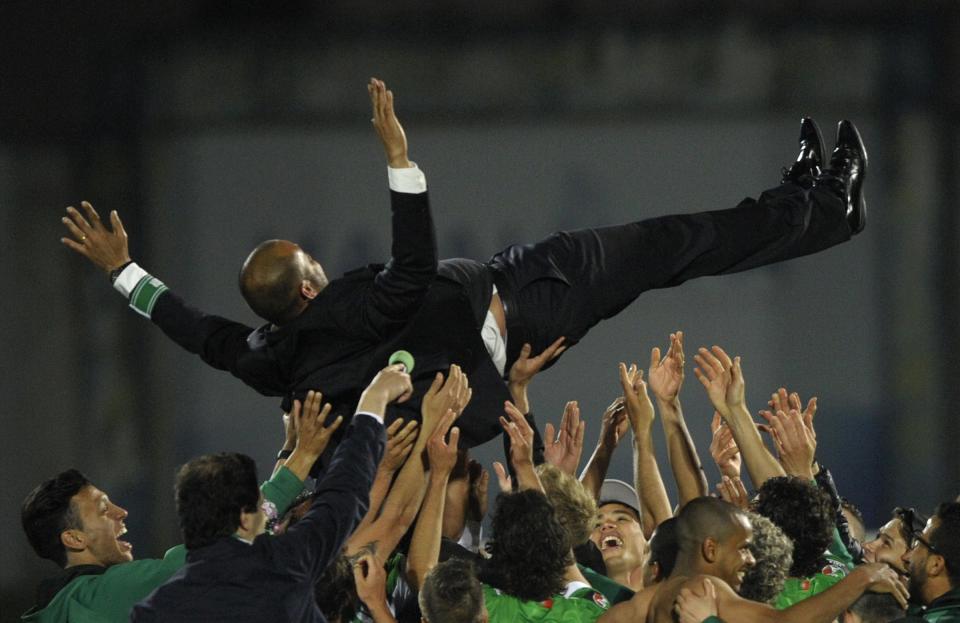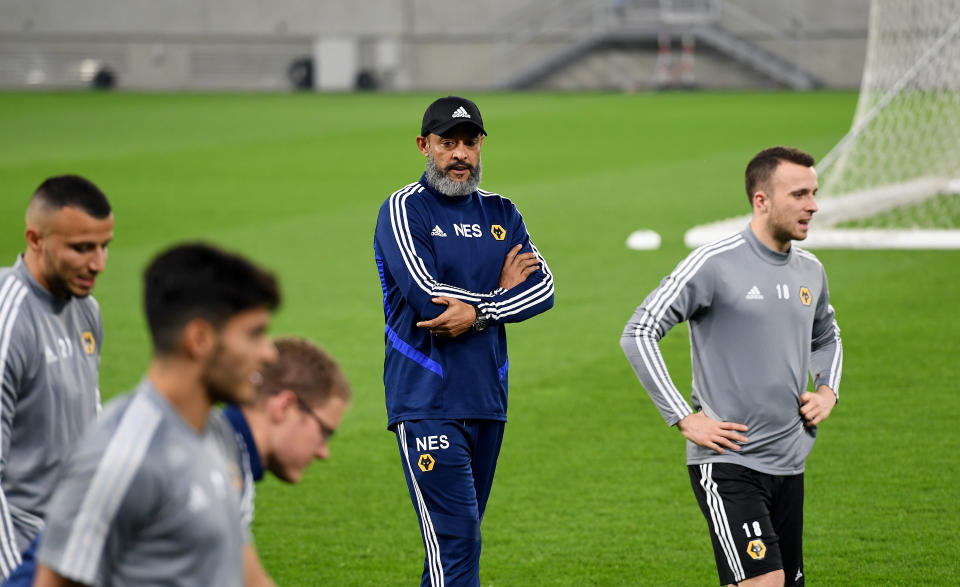Nuno Espirito Santo: From backup goalkeeper to managerial master at Wolves

A Championship title. Promotion to the Premier League. Qualification to the Europa League last season, sitting pretty in fifth currently.
It’s fair to say Nuno Espirito Santo has made a stunning impact to Wolverhampton Wanderers in just two and half seasons at the midlands club.
And on Thursday night he returns to where it all began as his Wolves team take on Braga in Portugal, half an hour from where his managerial career started seven years ago.
Having finished his career at Porto in 2010, the former goalkeeper undertook his coaching badges in Scotland with his eye on becoming a top tier manager. His first port of call was Rio Ave in the north west of Portugal, a club settled in mid-table of Primeira Liga.
Known for being Jorge Mendes’ first client, Nuno operated as a backup goalkeeper for the likes of Porto and Dynamo Moscow. Time on the bench allowed him plenty of hours to contemplate his footballing philosophy and the type of coach he would be. One of his first signings was winger Tope Obadeyi, after the former England youth international had left Bolton.
“It was the first time I’d had a goalkeeper as a coach,” Obadeyi explains. “Sometimes a goalkeeping coach will have some input but I’d never had one as a manager.”
It did not take long for Nuno to earn the respect of his players as he got his message across on the training ground that he wanted to take on the country’s biggest clubs.
“When I first met him he was a gentleman, a really nice guy and he explained that he’d done his coaching badges in Scotland,” he added. “I do not know how he knew about me at the time, but he did.
“On the pitch, he was the complete opposite. I am not saying he wasn’t a nice guy but he was very professional. But on the pitch it was work time and he was very meticulous with everything he did.”

Attention to detail was key to Nuno’s philosophy as he scouted the upcoming opposition and adapted accordingly in order to get the desired response from his team.
“Whatever the result from one game to the next it was a case of ‘that’s gone now’ and we go to work. If you did something he didn’t like, you would know about it - in the nicest possible way. I wouldn’t say I was shocked as I’ve worked with other managers like that who are different off the pitch to on it.
“Players knew it was work time on the training ground and even though it was his first job players respected him straight away, even though he was a goalkeeper.”
Nuno brought young Scottish coach Ian Cathro with him having met on their coaching course. Cathro, who never played professionally, was made assistant manager by Nuno aged just 26 leading Dundee United’s academy, a key signing and a sign of his head coach’s eye for talent.
“I would say he is one of the best managers I’ve worked with in terms of drills and coaching sessions, which were always well thought through and I thoroughly enjoyed them. He had Ian Cathro with him, who was also taking part in some of the sessions,” Obadeyi explains.
“Nuno was very hands on as a coach, he was on the training ground every day and with it being his first job he was putting in as much work as he could with the team and it showed in the results. At first, due to him being a goalkeeper, you were raising your eyebrows at some of the stuff but once you got onto the pitch and worked with him, I was surprised and I really enjoyed working with him.”
Obadeyi did not speak Portuguese when he moved, so Nuno paid special attention to his young winger to make sure he settled in his new surroundings and felt comfortable.

“I was 22 at the time and going to a new country having just left Bolton and it was difficult at first but Nuno spoke very good English, so he would always come up to speak to me to make sure everything was OK and that I had everything I needed and whether I had understood everything in the sessions. He was welcoming and helped me try to settle, knowing I was one of the few foreigners.”
One of Odabeyi’s best friends at Rio Ave was Jan Oblak who has gone on to be one of the world’s best goalkeepers at Atletico Madrid. His understudy was Manchester City’s Ederson, not a bad duo to have as the last line of defence.
“A fantastic goalkeeper, he left and Ederson got the chance to play. It showed Nuno had an eye for young talent. I think a lot of players in that squad went on to bigger clubs, going on to play for Benfica, Braga and others. He trusted younger players; if you had talent he would give you a chance and it showed with Oblak and Ederson.”
Nuno has not changed much from his early days as a coach and maintains his rigorous training programme to ensure his players are always ready for the next match.

“He would let rip if he had to on the training ground. People say goalkeepers are crazy and you could see that as he could flick the switch at anytime. Pre-match and at half-time it was calmer, speaking to the players to get a point across, he would let you know if things weren’t going well and remind you of your job. It was calm and collected.
“Sometimes you can scream and shout and not get the best out of them or be the opposite and fire them up but he stuck to a calm approach.
“It’s a technical league but it is also physical and he wanted his players to fight and get stuck in. Every day in training you had to wear shin pads, which is not normal, even in England, and he has taken that to Wolves.
“I am not saying no one wants to put a tackle in in England but it’s generally more relaxed but he wanted you to train how you play or you got fined. It was quite technical and attacking but if we played against one of the big teams such as Porto, Benfica or Sporting Lisbon, who we beat at the time, it was more defensive and we hit them on the counter attack. It was a case of we fight together, we fight as a team, we fight as one.”
The staff employed at Rio Ave are still with Nuno at Wolves, having followed him to Valencia and Porto after their first collaboration.
“I knew he would go on to better things. He spent two years there and went off to Valencia, which shows how much he valued his work, how much he trusted his staff and trusted his guns.”
Featured from our writers:
Deontay Wilder 'ready for Tyson Fury' after Luis Ortiz knockout
Kevin de Bruyne - Man City not focused on Liverpool, Leicester or Chelsea
Riyad Mahrez stunner helps Manchester City edge to victory over top four rivals Chelsea
